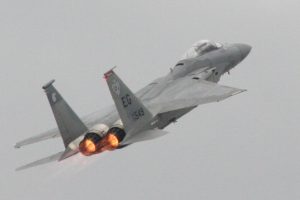The U.S. has indicated it is willing to sell F-15 and F-18 fighter jets to Indonesia following months of talks between top defense officials from the two countries. On December 10, Nikkei Asia reported that the deal was brokered during Acting Secretary of Defense Christopher Miller’s visit to Jakarta this week, during which he met with his Indonesian counterpart Prabowo Subianto.
The Nikkei report was based on comments from Rodon Pedrason, director-general of defense strategy at Indonesia’s Ministry of Defense.
While in Jakarta, Miller also met with Indonesian Foreign Affairs Retno Marsudi and military commander Hadi Tjahjanto, with whom he discussed plans to step up training between the two forces, according to the official readout from U.S. Department of Defense.
“The secretary emphasized the importance the department of defense places on the bilateral partnership and in securing a free and open South China Sea and Indo-Pacific region,” stated the readout.
Miller’s visit follows Prabowo’s five-day visit to Washington in October, when he held talks with leading Pentagon officials including Miller’s predecessor Mark Esper, who has fired by President Trump last month. Prabowo’s visit required the lifting of a two-decade entry ban imposed over the former general’s alleged involvement in human rights violations dating back to the era of Suharto before 1998.
Indonesia has long sought to upgrade its aging fleet of F-16 jets, originally purchased from the U.S. by Suharto’s government in the late 1980s and 1990s, which it operates alongside a sprinkling of Russian Su-27SKM and Su-30 fighters.
Earlier this year, Prabowo explored the possibility of purchasing a batch of second-hand Eurofighter Typhoon jet fighters from the Austrian air force. During Prabowo’s visit to Washington in October, he also reportedly expressed desires for Indonesia to acquire Lockheed Martin’s advanced F-35 stealth fighter, though U.S. officials turned down the idea, claiming that the order could take up to a decade to fulfill. Instead, it appears that the two sides have settled on combination of F-15s and F-18s, which are manufactured by the U.S. aerospace companies McDonnell Douglas and Boeing.
The procurement of new U.S. fighter jets would strengthen Indonesia’s ability to deter Chinese incursions into areas of the South China Sea around the Natuna Islands, where its 200-nautical-mile Exclusive Economic Zone overlaps with China’s massive “nine-dash line” maritime claim. In recent years, the two nations have experienced increasing frictions in the area, mainly due to the incursion of Chinese fishing boats and coast guard vessels into the area.
According to Pedrason of the Indonesian Defense Ministry, the potential purchase of U.S. jets elicited immediate concerns from the Chinese government. “They asked, ‘Why did you accept them?’ To which we responded diplomatically. We don’t want either China or the U.S. to feel neglected,” Pedrason said in a webinar on December 8, according to Nikkei Asia.
Miller’s visit to Jakarta was part of an Asian tour that also took him to the Philippines and the headquarters of the U.S. military’s Indo-Pacific Command in Hawaii. While in the Philippines, Miller announced the delivery of nearly $30 million worth of weapons to the Philippines, including equipment for snipers and anti-bomb squads. This came after National Security Adviser Robert O’Brien handed over $18 million worth of new weaponry, included precision-guided munitions, during a visit to Manila last month.
It was just the latest in a flurry of Asian visits by senior U.S. officials at the fag end of the Trump administration, which has made assiduous efforts to push Southeast Asian countries to counter China’s influence in the region, particularly in the South China Sea. As Trump turns toward the exit following his defeat at the U.S. presidential election last month, Jakarta and Manila will be just two regional capitals watching with great interest to see how what approach his successor takes toward the region.

































